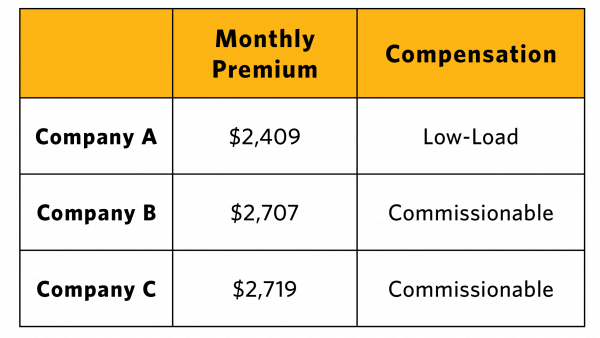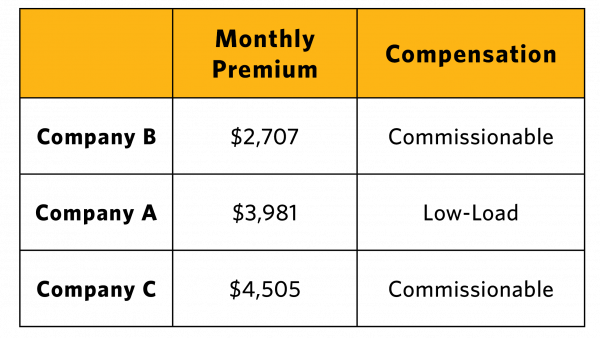

“The development of low-load insurance products is a significant step — demonstrating industry alignment with the way clients want to do business.”
You have a fiduciary duty to your clients, but they need reliable insurance products. So what is an advisor to do?
Although there has been explosive growth in the independent RIA channel in recent years — with many advisors choosing a low-load model — the insurance industry has lagged. Low-load products (also called “fee-only” or “commission-free”) have been gaining a lot of attention, but is this the best solution for you and your clients?

The development of low-load products has been historically focused on annuities. Lately, however, there have been some meaningful strides with low-load life products. These solutions allow clients to access insurance products by paying their advisor through an advisory fee rather than built-in product commissions.
The development of low-load insurance products is a significant step — demonstrating industry alignment with the way clients want to do business. Still, these products are in their infancy, and evaluating the appropriate product is not as simple as choosing one with or without a commission. In fact, the key to successfully optimizing client outcomes has very little to do with advisor compensation.
Successful outcomes in today’s insurance market require a comprehensive approach with aggressive advocacy. An optimal client result might very well be derived from a low-load product. However, it is possible that a product with transaction-related commission will deliver the best solution. Let’s look at an example from a recent case.
John Smith, age 55, had a significant business debt and wanted to ensure the orderly sale of his business in the event of his death. John’s advisor suggested that he purchase $10M of 20-year term life insurance coverage to cover this debt. The initial market price based on a preferred non-smoker rating was as follows:

$10M, 20-Year Term–Preferred NS Rating
At first glance, it would seem Company A’s low-load product, which had the lowest premium, was the best option for John. Following the underwriting evaluation, however, John didn’t qualify for the above rates. Nevertheless, through advocacy and negotiations with the selected carriers, John received the following offers:

$10M, 20-Year Term–Negotiated Underwriting Offers
As it turned out, Company A returned an offer with a standard rating – two risk classes below John’s expectation. However, Companies A and C returned offers with the standard non-smoker rating John expected to receive. If John had formally applied to Company A without any pre-underwriting or negotiation, his resulting monthly premium would have been 65% higher than the market rate he expected to pay.
Had John’s advisor counseled him merely based on a compensation philosophy, she would have inadvertently advised John to purchase a policy with a much higher monthly premium than was possible with a different, yet comparable, insurance product.*
Low-load products certainly have a place in an evolving insurance market, and there will continue to be advocates, like Palladium Group, for greater alignment with fee-only advisors. What will not change is that advisors and their clients will always need access to the most competitive products to achieve optimal results. In some cases, that may be a low-load product. Yet, in others, it may be one with transaction-related commission. No two clients or situations are the same, and the importance of advocacy and negotiation by industry experts cannot be understated.
Advisors need access to a broad portfolio of both commissionable and low-load products, and an insurance partner driven by results, not compensation. The insurance experts at Palladium Group can help.
This is about outcomes over incomes.
People over products.
Success, insured.
The client’s name and identifying details have been changed to protect the privacy of the individual. This case is for illustrative purposes only and does not represent every scenario.
*This material is for financial professional and educational use only. Not to be reproduced or shown to clients.